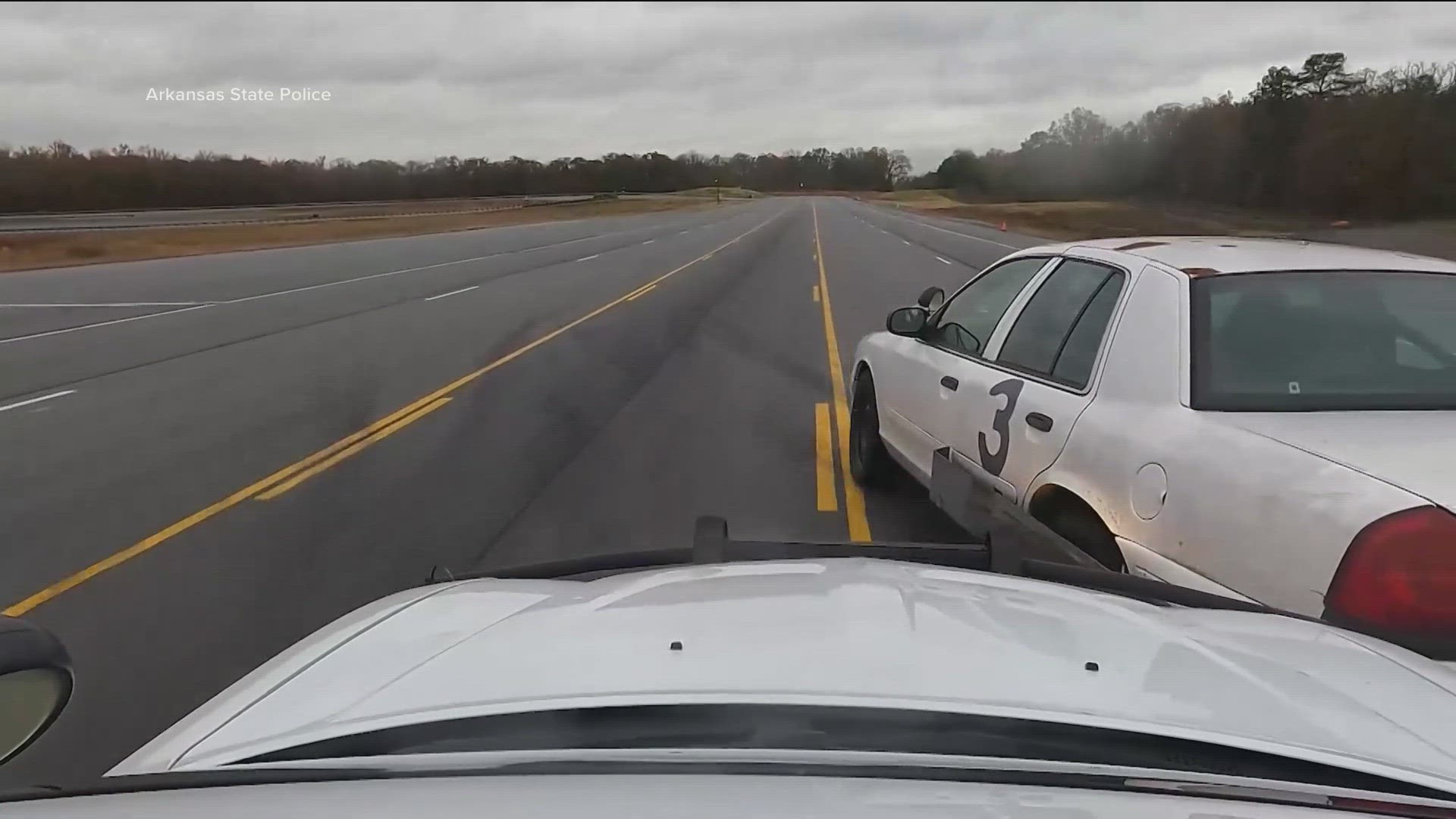NORTH LITTLE ROCK, Ark. — High-speed chases caught on camera have become easy clicks for content creators who post them, but behind the camera, authentic life-or-death decisions are being made by the police involved.
According to numbers from Arkansas State Police, more and more drivers seem willing to force troopers into making those decisions, with their commanders drilling them to get ready.
"We're never done training," said Arkansas State Police Lt. Col. Mike Kennedy, the administrator in charge of training the state's elite law enforcement officers. "There's a 100 percent chance [troopers] will have to use force in their career. It's probably going to be a non-deadly force, but there is definitely going to be a vehicle pursuit involved in that at some point."
That eventuality is why Arkansas built a state-of-the-art racetrack for various emergency vehicle operations training. They learn the dynamics of taking turns at speeds over 85 mph, straight-line breaking from those speeds, evasive maneuvers, and on an extended straightaway, ending chases using tactical vehicle interventions (TVIs), including the precision immobilization technique.
"We're in the business to protect the public." Arkansas State Police Director Col. Mike Hager said. "The easiest way we can do that is to stop these pursuits."
Increasingly, state troopers, local officers and deputies find themselves using the PIT maneuver, where the chase car comes alongside the rear fender of the fleeing vehicle. The chase car steers into the bumper, forcing it to spin. Ideally, the car spins to a stop, but just as often, it results in a crash.
With video of these chases easily obtained by a records request, the crashes have become fodder for online creators, with dashcam video providing dramatic content and clicks.
At the same time, the proliferation generates criticism for what looks like reckless police behavior.
"I went to troop school in 1996," Hager said. "I was taught this technique, and we basically had the same fundamental response to ending pursuits that we've always had. You hear about it now more."
Regardless of how often we hear and see them, data shows state police are doing them more.
The latest numbers from 2023 show an astounding 620 pursuits, with 251 ending with a PIT/TVI. That mark is 219 more than eight years ago.
Last year, troopers ended 41% of chases with a PIT maneuver. In 2016, they made up only 11%
"Right now, we have suspects that do not fear the law," Hager claimed. "They're more prone to flee. Until we get a hold of that, until we realize as a society, and as a criminal justice system, that's not working, there has to be a punishment for it, then we're going to see this continue."
But the criticism is not lost on Kennedy, so TVI training emphasizes ending chases quickly.
"If we can take a 15-minute pursuit, and we limit that time to about five minutes, there's 10 minutes of liability we just did away with," Kennedy said. "Every car we pass, every intersection we blow through is a potential catastrophe."
Much of the criticism of these maneuvers stems from an incident in 2021. Trooper Rodney Dunn went to pull over Janice Harper for allegedly speeding and then executed a PIT after she failed to stop.
It led to a lawsuit and eventually discipline for Dunn.
"We've had 3,745 pursuits we've been engaged in since 2016," Kennedy said. "Every once in a while, we'll get one wrong."
A spokesperson for the state police said that the mistakes made that night are part of the training they do today. Kennedy also prepares troopers for the danger to extend beyond the chase.
"There's also a chance we're going to a gunfight in this thing," Kennedy said. "We train for that. We do traffic stop scenarios at troop school and also [later] in-service training."
An incident on Jan. 1, one of seven TVIs troopers executed over three days on New Year's weekend, exemplifies that.
The chase started in Saline County and ended in southwest Little Rock when police reports said troopers spun a wanted suspect named Aaron Watson on an exit ramp from Interstate 30.
Police said Watson fired at them, so they returned fire and killed him.
"It doesn't just end with a TVI," Kennedy said. "Although that's what YouTube wants you to see... the TVI."
Hager wants Arkansans to know that he sees beyond the spectacular crashes these procedures produce. He wants residents and drivers to understand that an order of importance is drilled into troopers's heads.
"Our priority of life will always be the innocent civilian, then the law enforcement officer, then the suspect," Hager said. "As long as they keep that life priority in check, I think they're at peace with that."

